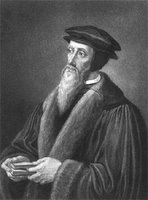 Loved by many, yet hated by more. John Calvin, the great Reformer, has bequeathed us a schizophrenic legacy.
Loved by many, yet hated by more. John Calvin, the great Reformer, has bequeathed us a schizophrenic legacy.
He is remembered largely for the movement which carries his name: Calvinism. Predestination, cold hard logic, spiritual deadness, fatalists. This is how many view Calvinists today. Sure there are some who earn such descriptors, yet the historical orthodox movement bears greater resemblance to its founder than it does to a hyper-Calvinistic heresy.
Some view Calvin as the dictator of Geneva, yet in truth he was run out of town a time or two. He was a respected pastor, but simply a pastor. The town council condemned Servetus, and Calvin pleaded for the most merciful death available. In this he was a man of his times.
And how did his contemporaries view him? Most definitely not cold and logical. He was later chided as “the most Christian man of his generation”. Benjamin Warfield, the great Princeton theologian, described Calvin as the eminent Biblical theologian of his day (emphasis on “Biblical” rather than “theoretical” or “speculative”).
I could go on, but I would be writing the article I intend for you to read. John Chitty recently highlighted several of Calvin’s positive contributions to today’s church and he also linked to a superb article by Benjamin Warfield on Calvin as a theologian.
Among other things, Warfield points out that Calvin was the first to give a full treatment of the doctrine of the Holy Spirit. And in fact, when with the Reformers, Calvin dethroned the Church of Rome, he put in its place the Holy Spirit. Let me continue with an excerpt from Warfield’s article:
Previously, men had looked to the Church for all the trustworthy knowledge of God obtainable, and as well for all the communications of grace accessible. Calvin taught them that neither function has been committed to the Church, but God the Holy Spirit has retained both in His own hands and confers both knowledge of God and communion with God on whom He will. The Institutes is, accordingly, just a treatise on the work of God the Holy Spirit in making God savingly known to sinful man, and bringing sinful man into holy communion with God….
Here then is probably Calvin’s greatest contribution to theological development. In his hands, for the first time in the history of the Church, the doctrine of the Holy Spirit comes to its rights. Into the heart of none more than into his did the vision of the glory of God shine, and no one has been more determined than he not to give the glory of God to another….And above everything else he deserves, therefore, the great name of the theologian of the Holy Spirit.
[read the article in its entirety]
Like this:
Like Loading...

 Part 14 in a
Part 14 in a  Loved by many, yet hated by more. John Calvin, the great Reformer, has bequeathed us a schizophrenic legacy.
Loved by many, yet hated by more. John Calvin, the great Reformer, has bequeathed us a schizophrenic legacy.